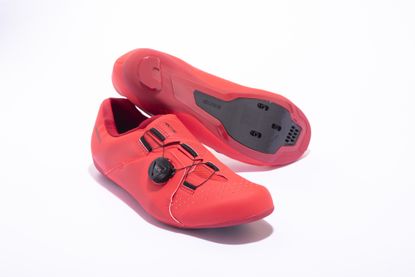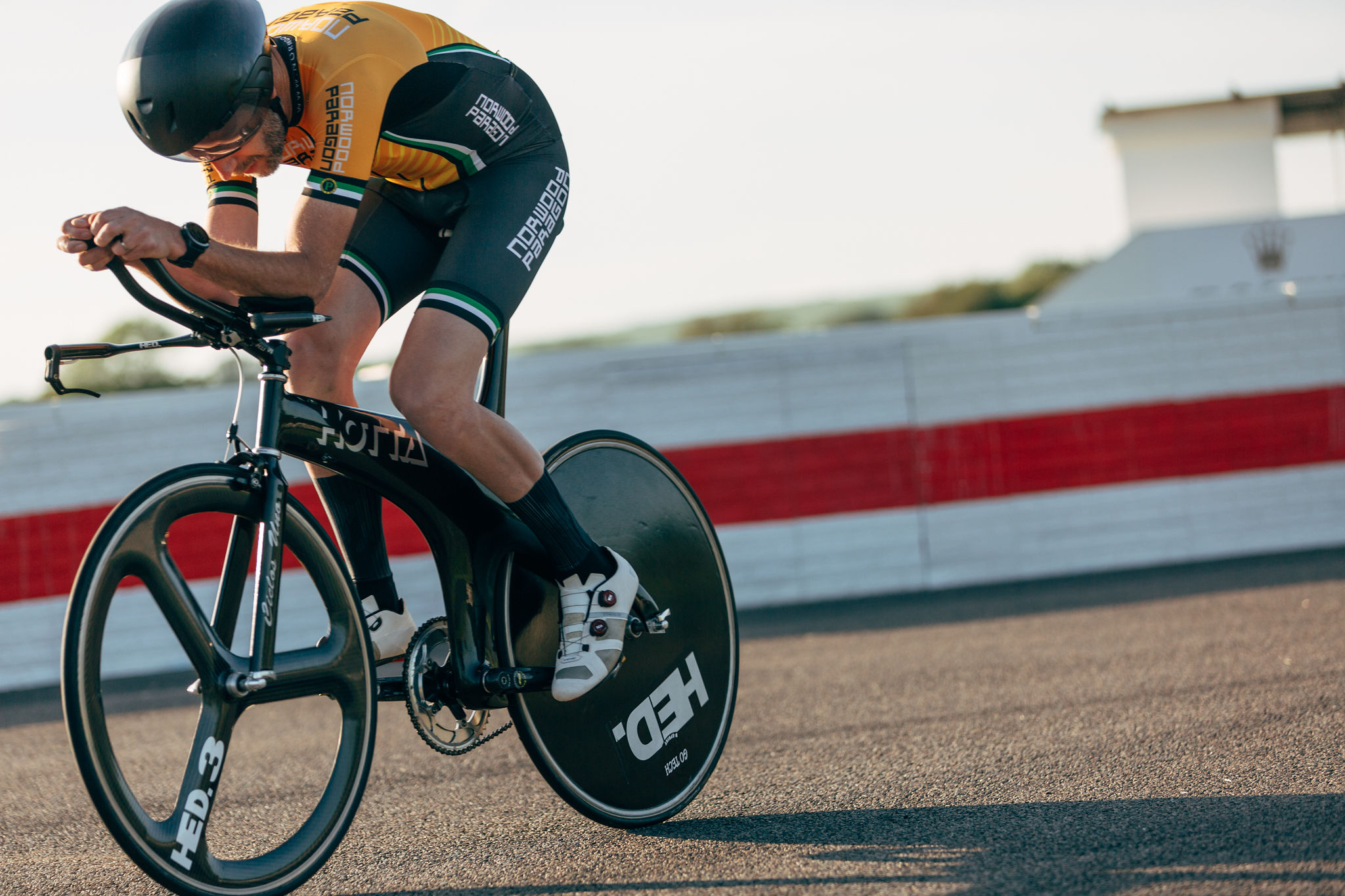Shimano RC3 cycling shoes review
Taking design cues and trickle-down tech from the pro-level S-Phyre RC9s, the Shimano RC3s have a high-end look and feel, but sole stiffness is aimed more at comfort than performance

The Shimano RC3s are good looking, comfortable and well made but a flexible sole means they’re not as performance orientated as you might expect given Shimano's description and their three-bolt cleat designation. Having said that, if you’re happy with a comfortable fit, you like the indisputably high-end look of the RC3s and you're cycling for enjoyment rather than performance (although of course the two aren't mutually exclusive), the RC3s would make a good everyday or commuting shoe.
-
+
Comfortable
-
+
Good looking
-
+
Low stack height
-
-
Flexible sole
-
-
Needs closure at toes
- -
You can trust Cycling Weekly.

Shimano says the RC3 is for “finding that sweet spot between comfort for bigger rides and efficient power transfer when you want to put the hammer down.” Based on a last design (Dynalast) that derives from Shimano’s pro-level S-Phyre RC9 series shoes, comfort is good, but compared to other cycling shoes at this price, performance doesn’t quite measure up mainly due to the sole. We found it was the most flexible of the five sub-£100 shoes we tested recently, which were the Bontrager Starvos, the dhb Dorica Carbon, the Giro Stylus and the Specialized Torch 1.0.
Shimano RC3: construction
According to Shimano, the RC3 is aimed not at beginner cyclists – it has the RC1 (£79.99) for that – but at those who are cycling a bit further or faster, and are looking to boost their performance. Or, for “athletes who are new to cycling but are focusing on performance.”
It’s clear there’s been plenty of trickle-down from the lofty heights of the Shimano S-Phyre RC9 shoes (£319.99) which we included in our Editor's Choice list in 2018, and the Shimano RC3 has a very high-end look with its perforated synthetic leather upper, offset closure system and single Boa dial.
>>> Read more: Shimano RC7 review
There’s no tongue – the outside of the upper simply extends over the top of the foot and wraps underneath the three anchor points opposite the Boa dial (the one-way L6 type). It’s a clever way of eliminating a tongue, which can be fiddly to set up and keep in place, and it also gives it a very clean look.

The heel cup is a little more sculpted than on many shoes at this level, using shaping rather than padding to hold the heel firmly but comfortably.
The sole is, according to Shimano, made from nylon with glass fibre reinforcement. It has a honeycomb structure underneath the insole, which is designed to add strength and reduce weight. Shimano also claims a low stack height thanks to the upper being bonded almost to the underneath of the sole.
There’s drilling for a three-bolt delta-style cleat – the RC3 sole won’t accommodate the two-bolt SPD type.

Shimano rates the RC3's sole stiffness at six out of a possible 12 on its own index. The RC1 is also rated six, with the RC5 getting eight. As I’ve mentioned, compared with other shoes at this price, the RC3’s sole is flexible. Even for those athletes new to cycling who are focusing on performance, I would say it’s not enough for efficient power transfer.
The insole is fairly basic, as you’d expect at this price, but support at the arch from the shape of the sole and upper is actually pretty good.
At 265g per shoe for the size 44, they're reasonably lightweight. And they also come in black if you're not into the ruby slippers look.
The ride
Shimano has done what many manufacturers do with their lower-priced shoes and made the fit a little more generous with the aim of adding comfort, although the length remains the same. I found this approach worked well for comfort, but for more performance-orientated riding – which Shimano claims the shoe can offer – the single Boa dial struggled to pull the upper together evenly. The wires tended to tighten at the lower section of the foot first, making it tricky to get an even tension across the whole foot. The RC3 is the only shoe in Shimano’s range to rely on just one Boa for the entire closure: the entry-level RC1 uses three Velcro straps and one up the range the RC5 has a Boa higher up the foot and a Velcro strap over the toe, the same as the Specialized Torch 1.0.
Due to the roomy upper and single Boa closure it was difficult to achieve the feeling of the foot being locked in but not constricted. Once I’d gone as far as I could with that, the sole’s limitations started to become more apparent. Because it’s both thin and flexible, I could feel pressure from the cleat and pedal. A stiffer sole dissipates that pressure so that it’s possible to press harder on the pedals, but the RC3s started to give me hotspots above the outside edges of the cleat during harder intervals.
As with many entry-level or lower-end shoes, the RC3 uppers are robust, made from the same synthetic leather throughout, with just one mesh panel at the bottom of what would be the tongue and perforations above the toe box. There's also a small grille at the front of the sole for ventilation underneath. They cope well with chillier outdoor riding, but needless to say they're not the coolest indoors.
Value
Shimano’s shoe range is extensive, meaning each model goes up in performance terms in relatively small increments. With the RC3 Shimano seems to have decided that a single Boa closure rather than the three Velcro straps represent a step up from the entry-level Shimano RC1 (£79.99), but it doesn’t upgrade the stiffness of the sole until RC5 level (£139.99), which is one step up from the RC3. So it could arguably be worth spending a bit less and buying the RC1 if you’re a beginning cyclist who wants to get used to riding with clipless pedals and then, if you get on well with Shimano shoes, bypassing the RC3s and jumping up to the RC5s (which we scored a near perfect 9/10) when you’re ready to work on levelling up your performance.

Thank you for reading 20 articles this month* Join now for unlimited access
Enjoy your first month for just £1 / $1 / €1
*Read 5 free articles per month without a subscription

Join now for unlimited access
Try first month for just £1 / $1 / €1
Get The Leadout Newsletter
The latest race content, interviews, features, reviews and expert buying guides, direct to your inbox!
Simon Smythe is a hugely experienced cycling tech writer, who has been writing for Cycling Weekly since 2003. Until recently he was our senior tech writer. In his cycling career Simon has mostly focused on time trialling with a national medal, a few open wins and his club's 30-mile record in his palmares. These days he spends most of his time testing road bikes, or on a tandem doing the school run with his younger son.
-
 In search of the world's best club jersey: Jubilee Park CC v Kibworth Velo Club
In search of the world's best club jersey: Jubilee Park CC v Kibworth Velo ClubEvery week we pit two club kits against each other and you get to vote on the best designs
By James Shrubsall Published
-
 'I had to wait at the top of every hill' – the highs and lows of Malcolm Elliott's career in the fast lane
'I had to wait at the top of every hill' – the highs and lows of Malcolm Elliott's career in the fast laneThroughout his two-part career, no-one epitomised Sheffield steel like Cycling Weekly's 2023 Lifetime Achievement award winner Malcolm Elliott
By James Shrubsall Published
-
 'I never wanted to be known as the TikTok cyclist' - how Alison Jackson wrote her legacy at Paris-Roubaix
'I never wanted to be known as the TikTok cyclist' - how Alison Jackson wrote her legacy at Paris-RoubaixThe Canadian tells Cycling Weekly how a day across the cobbles of northern France changed her career
By Tom Davidson Published


